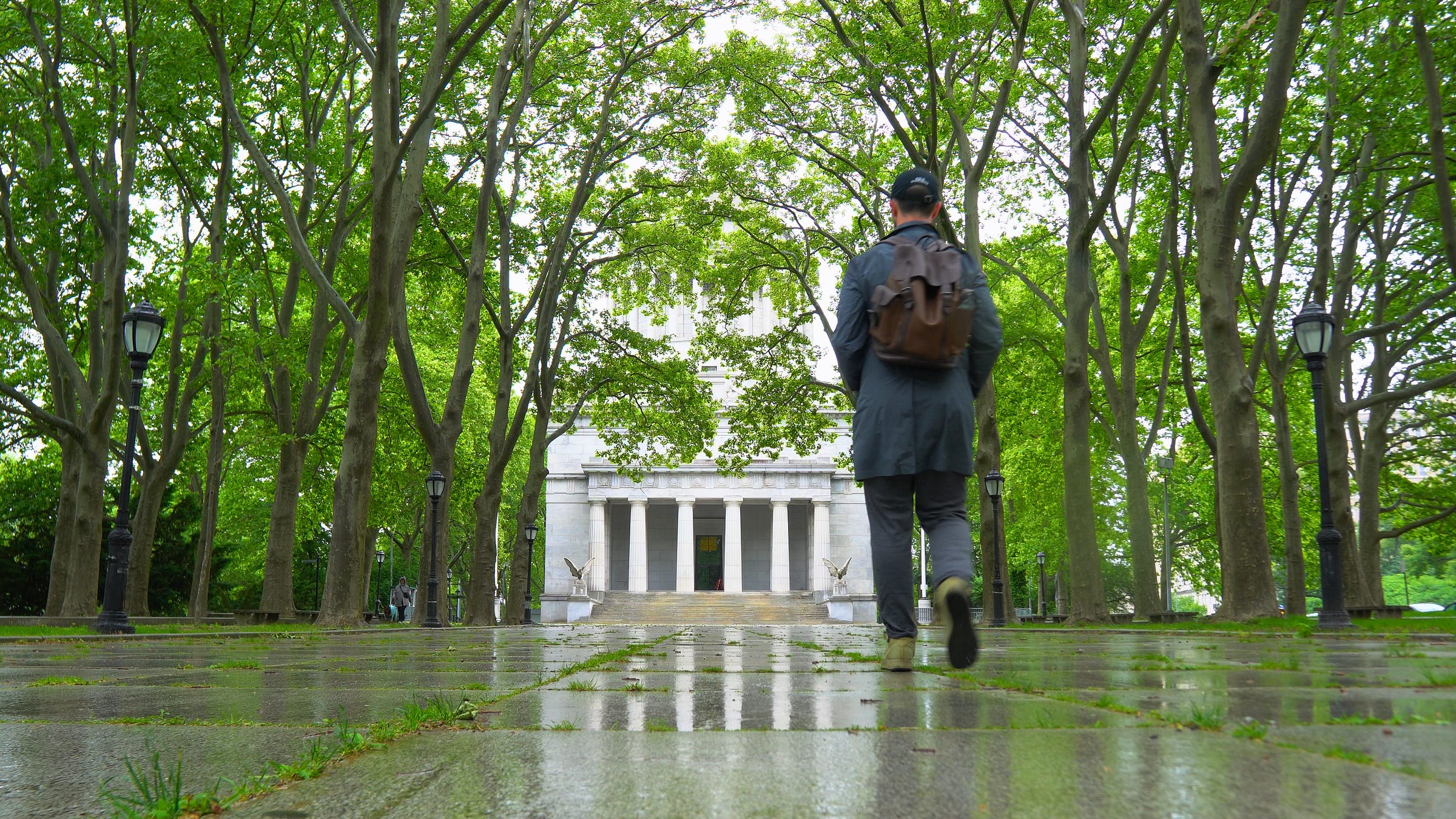We Need More Leaders Like Ulysses S. Grant
Reflecting on a visit to Grant's Tomb, an underrated gem in New York City

I recently went to Grant’s Tomb, nestled along the Hudson River in Manhattan’s Morningside Heights neighborhood. Most people think of New York City as busy and bustling, and while that’s largely true, pockets of peace and serenity exist. Grant’s Tomb is one of those pockets, serving as the final resting place for President Ulysses S. Grant and his wife, Julia.
But instead of finding complete peace, I felt a sense of metaphorical dread — I was alone at Grant’s Tomb for most of my visit (making the joke that nobody is actually “buried” here all the more real). Not only are many missing the majestic beauty and symbolism of the largest mausoleum in North America, we are missing leaders like Grant in our modern era. Walt Whitman described him in the following way:
“A common trader, money-maker, tanner, farmer of Illinois — general for the republic . . . in a war of attempted succession — President following, (as task of peace, more difficult than the war itself) — nothing heroic, as the authorities put it — and yet the greatest hero.”
Grant’s Tomb reminds us of the story of America. How even in her darkest hours, great leaders emerge to protect democratic ideals and ensure the arc of justice points to the good.
Ulysses S. Grant never wanted to be a leader
Grant also never wanted the “S” as his middle initial. It was a typo that was made while he was a cadet at West Point. That typo stuck.
Was it the universe foreshadowing the incredible impact U.S. Grant would have on preserving the union and fighting for her ideals, namely that all men are created equal?
I like to think so.
What I find most incredible about Grant is that he never actively sought leadership roles. They came to him. And when they did, he was ready. He was a veteran of the Mexican-American War and was living a peaceful rural life as a farmer and tanner when the call came to join the Union Army in the Civil War.
Up to that point in life, Grant had suffered from alcoholism and failed at practically everything. He had attempted numerous business ventures, almost all resulting in misery. His father-in-law was wealthy and gave him a job, in addition to a slave to help him.
Grant freed his own slave; an early revelation of the principles of a man ahead of his time. It’s no wonder he was later a champion of black suffrage and the 15th Amendment.
When he was enlisted as an officer in the Union Army, he was overshadowed by generals who fought in the eastern theater, mainly George Meade and George McClellan. Grant was sent to the west along the Mississippi River where he eventually made his mark. He was known for unconventional tactics that targeted enemy supply lines and infrastructure. But most of all, he was unafraid to fully engage the enemy and bring the fight to them.
Grant’s relentless total war approach led to key victories at places like Vicksburg, with his army almost single-handedly gaining control of the Mississippi River, splitting the South in two. This eventually led to his promotion as the Commanding General of the Union Army where he took the fight directly to the venerable Robert E. Lee.
Some accuse Grant of being a butcher, relying on the Union’s greater numbers to overwhelm the South, but by most accounts it was his strategy and military genius that destroyed the southern will to fight. As Ron Chernow describes in his biography on Grant, “[W]hile Lee attacked the front porch, Grant would attack the kitchen and the bedroom.”
This comprehensive strategy eventually led to Lee’s surrender at Appomattox Courthouse, and then perhaps Grant’s most important work started — reconstruction. Grant was magnanimous in victory, pardoning Confederate leaders with the help of President Lincoln and insisting on a smooth return for the South back into the Union. Simultaneously, he was a champion of safeguarding the rights of African Americans, assisting with the enforcement of the Civil War amendments.
After Lincoln was assassinated and Andrew Johnson became President, it became clear to Grant and other Republicans that Johnson was not planning to support their reconstruction efforts. The people pushed Grant, who had no ambition of seeking higher office, to run for President.
With the slogan that is now inscribed atop his tomb in Manhattan, “Let Us Have Peace”, he won a decisive election victory in 1868, and another 4 years later. His efforts at reconstruction in the South led to prosperity for African Americans and civil rights, but unfortunately it was short-lived as the Jim Crow South emerged shortly after Grant left office.
He was a leader ahead of his time; someone who followed in Lincoln’s footsteps by making best efforts at realizing the ideals America was founded on. While Lincoln receives attention and credit for his magnificent speeches and bold actions like the Emancipation Proclamation, Grant was an under-appreciated workhorse who spoke more with actions than words.
Until his death that is. With the help of Mark Twain, Grant published his Memoirs shortly after his death, finishing the final few pages as he was dying from cancer and on the verge of bankruptcy (after falling victim to yet another business failure). Grant’s Memoirs are considered by many as some of the greatest writing in American history.
We need more of Ulysses S. Grant in the 21st century
Few politicians today have such a deep connection to foundational principles and moral codes. While someone like Grant would probably not play well on platforms like X/Twitter or Threads, and certainly not on short form video or television, his leadership principles are necessary for the 21st century. The idea that certain values and ideals like equality and freedom for all are more important than personal gain or total victory is lost on many politicians and leaders today.
Grant and Lincoln did not have to act magnanimously towards the South or Confederate leaders. In victory, they could have attempted to charge them with treason or simply thrown them in a cell for betraying their country and the U.S. Constitution. We certainly hear calls for doing just that to political enemies in our modern era.
But Grant did the opposite, even after Lincoln’s death, when it wasn’t always popular in his political party and throughout the North. Remember, many men had died in a brutal war and there were numerous calls for revenge and retribution. Instead of falling prey to those calls, Grant advocated for peace and progress, securing civil rights for African Americans while smoothly incorporating the South back into the Union.
Whether it was a battlefield or a political field, Grant always saw the bigger picture. It’s something we need to keep in mind today more than ever. While it’s easy to get agitated by the political issue of the moment or the latest scandal, taking Grant’s approach of playing the long game could serve many of us well, both politically and in terms of our mental health.
Grant approached his former enemies with grace and magnanimity, a disarming combination that converted his opponents to allies. It’s a lesson we can all take today when managing our polarized political climate.
Our leaders have forgotten how to lead and people have forgotten about Grant’s Tomb
Ulysses S. Grant was the type of leader who put principles above all, even when it wasn’t in his best interests personally. It would have been politically easier not to push hard at enforcing the Civil War amendments and focusing on reconstruction in the South. We saw what happened when subsequent administrations took this easier route after Grant left office — the Jim Crow South led to lynchings and the loss of civil liberties for African Americans.
Like all great leaders, Grant knew that certain ideals and principles were more important to the greater good. He was willing to sacrifice any personal gain. In fact, he never cared for it, having been content as a farmer and tanner prior to getting the call to join the fight in the Civil War.
Many modern politicians, by contrast, use their public office for personal enrichment. Whether it’s meme coins, potential insider trading, or prioritizing career advancement over America’s best interests, many elected officials today blur the lines between their public and privates lives.
The leaders we need more than ever in America and around the world are those driven by principles not profit. The type of leaders who are willing to disagree with their constituency or political party when their views are not morally right, even if they are popular. We need leaders who are not afraid of doing the right thing, even if it’s much harder than the easier option. And those who are willing to put country over party and self.
Ulysses S. Grant was all of those things. You may just not hear about him as much because he was unassuming and largely unappreciated by many historians, aside from Ron Chernow’s excellent biography on the man.
Grant’s also largely forgotten by the city where he’s entombed. Ask most New Yorkers today, and while many could tell you about trending restaurants in the West Village, they would be hard-pressed to say anything about the largest mausoleum in North America further uptown.
They are missing an essential American story at Grant’s Tomb; one that covers the good, bad, and ugly of America. All of which are essential for meeting our current political moment.
So the next time you’re in New York City, do me a favor and give Grant’s Tomb a visit. Draw some lessons from one of the greatest leaders in American history. As Frederick Douglass said, “In him the Negro found a protector, the Indian a friend, a vanquished foe a brother, an imperiled nation a savior.”
Latest from The Political Prism:
Why Many American White Supremacists Seem to Love Israel by E.V. Solanas
The Climate Lie: How Both Parties Failed the Planet While China Passed Us By by Travis Warren Sr.
Why Are More Gay Men Voting for the Far Right? by Jdanielfernandez
AI Is Not the Victim: The Dangerous Precedent Set in an Arizona Courtroom by Bryan Driscoll
For more, you can find me on Medium, YouTube, Instagram, and TikTok.





We don’t just need more Grants, we need to remember them. Especially in a time where humility and principle seem like outdated concepts. Imagine if today’s politicians approached power with even a fraction of Grant’s humility and long game vision. Sigh!
I hope you are having a good weekend John :)
Happy Monday!
Holy wow, that mausoleum is unbelievable. Because I’ve only visited New York City once, I’ve never been to Grant’s Tomb.
But when I lived in the Washington, D.C. area, I used to love walking around downtown and going to visit the monuments.
A couple that had the most impact on me were Arlington Cemetery and the Lincoln Memorial. And yes, we definitely need more leaders like Grant today.